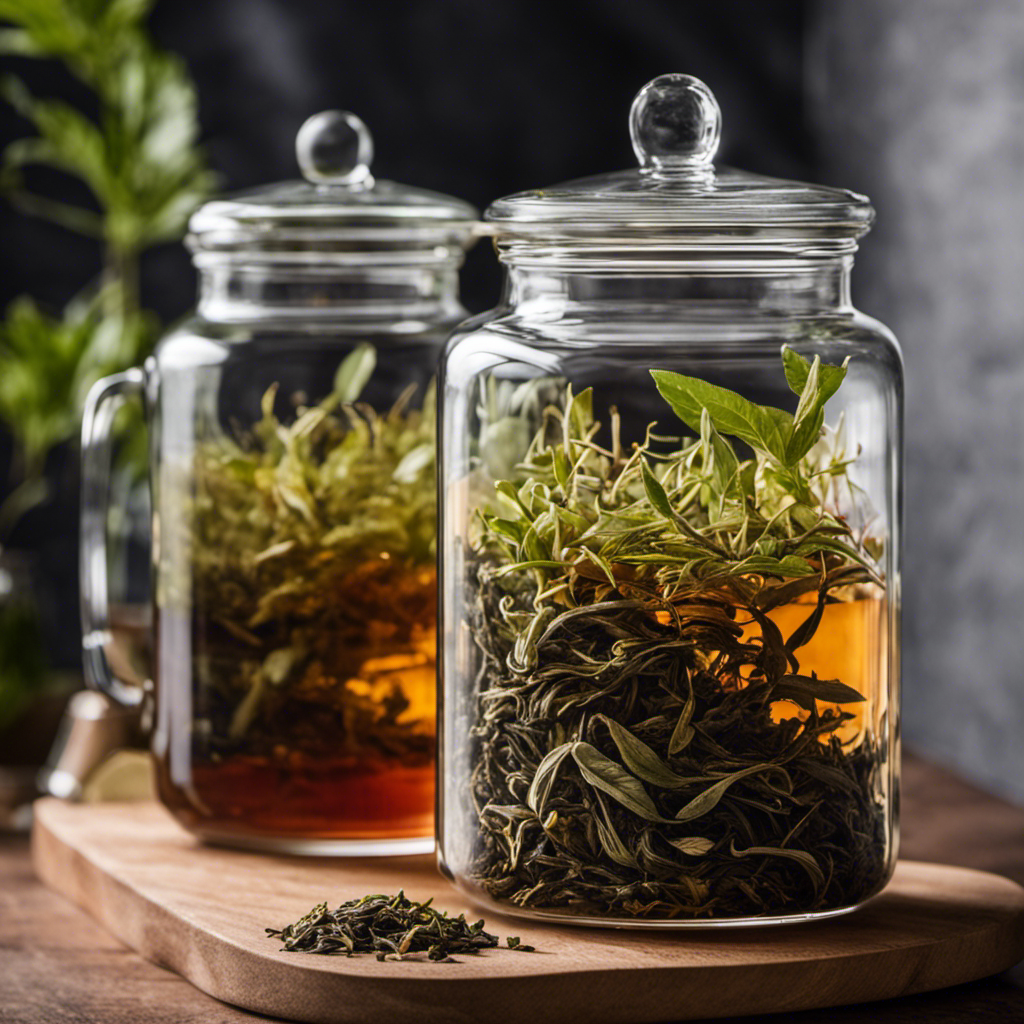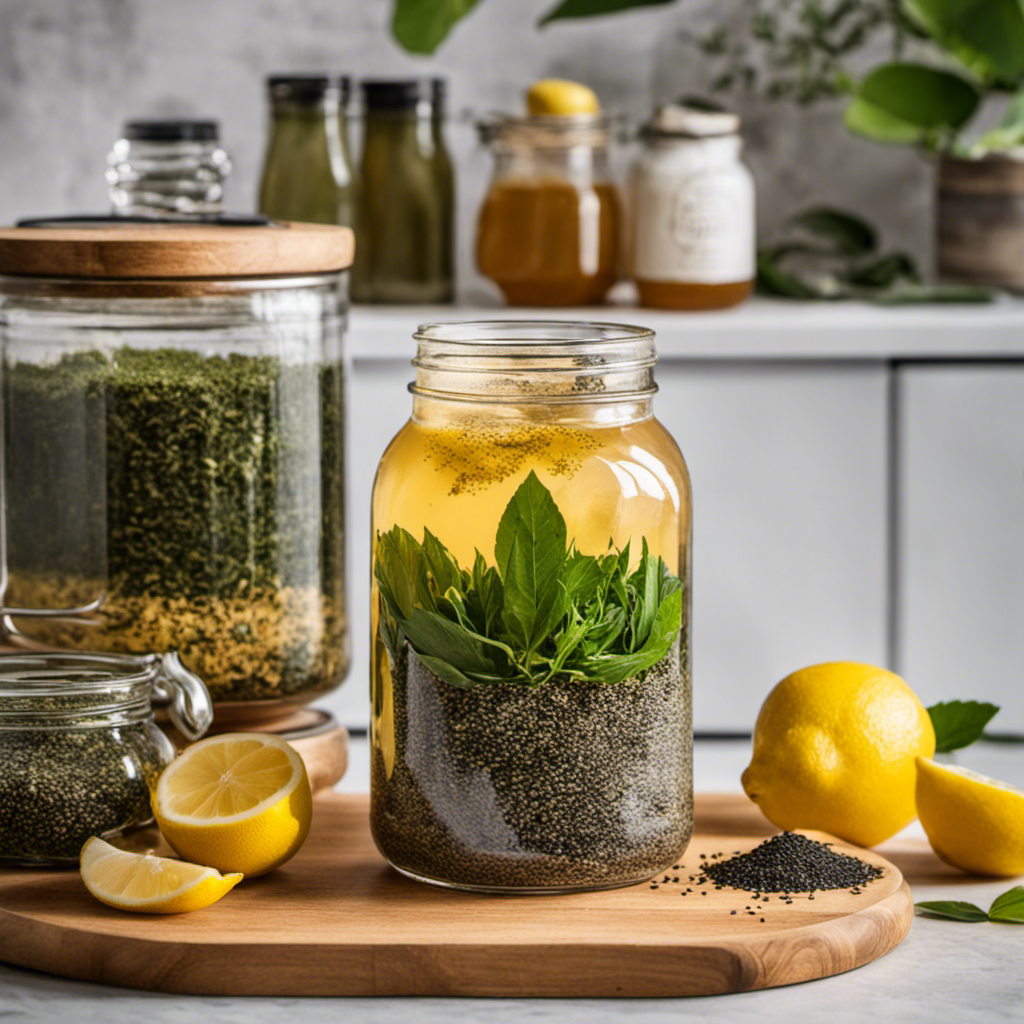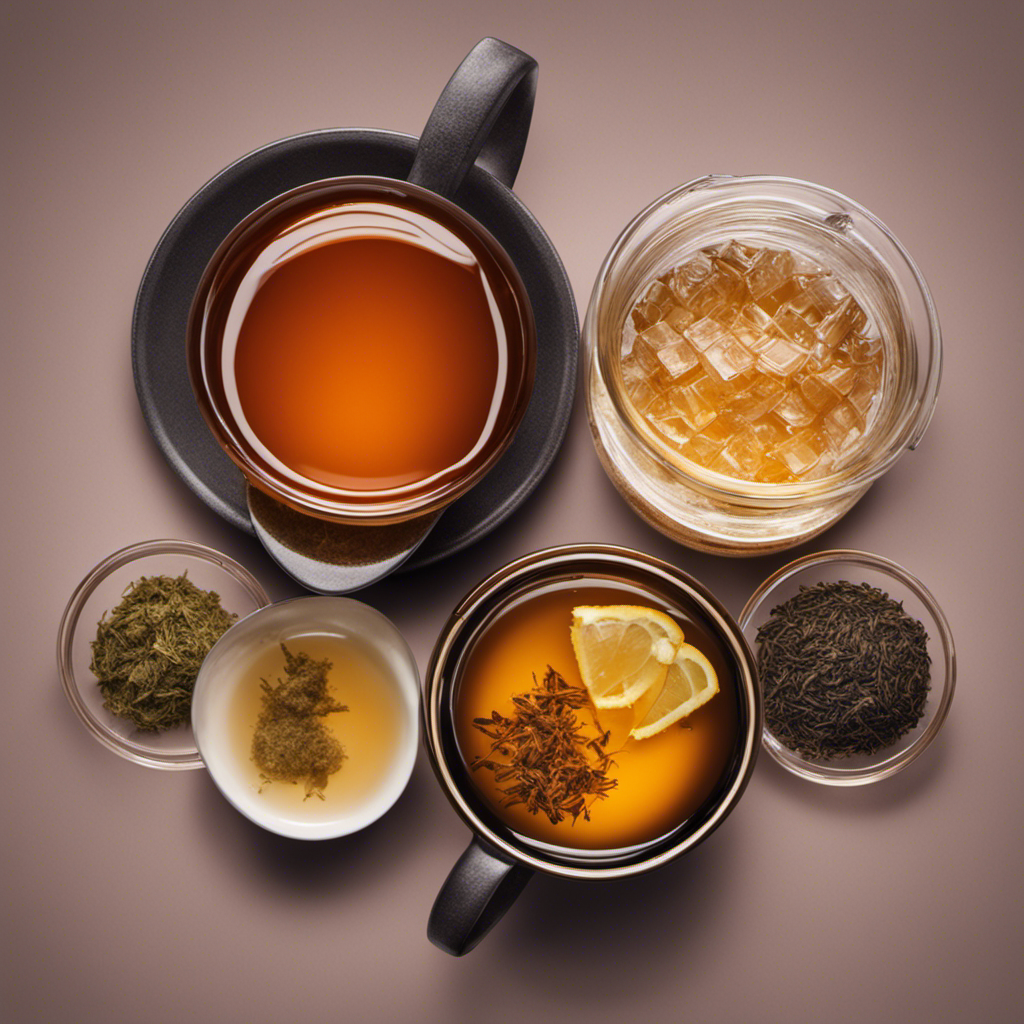Coffee Alternatives And Tea
The Best Tasting Sugar Substitute When Used in Coffee

Were you aware that more than 70% of American adults drink coffee daily? Being an aficionado of coffee, I can relate to the challenge of locating an ideal sugar alternative that maintains the flavor.
In this article, I will explore the world of natural, artificial, plant-based, low-calorie, and alternative sweeteners, and reveal the best tasting sugar substitute when used in coffee.
Get ready to discover a new way to enjoy your favorite beverage without the guilt or the saccharine aftertaste. Let’s dive in!
Key Takeaways
- Stevia is a natural sweetener derived from the leaves of the Stevia rebaudiana plant that provides a sweet taste without added calories or negative health effects.
- Splenda, an artificial sweetener made from sucralose, is a low-calorie option that tastes similar to sugar and has no aftertaste.
- Plant-based sweeteners like coconut sugar and maple syrup can enhance the flavor of coffee and offer health benefits.
- Low-calorie sweeteners such as monk fruit extract, erythritol, xylitol, and sucralose are alternative options that provide sweetness without raising blood sugar levels.
Natural Sweeteners for Coffee
Stevia is a great natural sweetener to use in coffee. It is derived from the leaves of the Stevia rebaudiana plant and provides a sweet taste without the added calories or negative health effects associated with traditional sugar.
One of the benefits of using stevia in coffee is its ability to enhance the flavor without overpowering it. Unlike other sweeteners, stevia has a clean, crisp taste that blends perfectly with the natural flavors of coffee.
Additionally, stevia is a great option for those who are watching their sugar intake or have diabetes, as it does not raise blood sugar levels. It can also be used in various coffee recipes, such as honey coffee, to add a touch of sweetness without the guilt.
Overall, stevia is a versatile and healthy choice for sweetening your daily cup of joe.
Artificial Sweeteners for Coffee
When it comes to coffee, there are various artificial sweeteners available that can enhance the flavor. Two popular options are Stevia and Splenda.
Stevia is a natural sweetener derived from the Stevia rebaudiana plant, while Splenda is a brand name for sucralose, a synthetic sugar substitute.
Here are some pros and cons of using these sweeteners in coffee:
-
Stevia:
-
Pros: It is calorie-free and does not raise blood sugar levels.
-
Cons: Some people find it has a bitter aftertaste.
-
Splenda:
-
Pros: It has a taste similar to sugar and does not have an aftertaste.
-
Cons: It contains a small amount of calories and may cause digestive issues in some individuals.
Another artificial sweetener option for coffee is monk fruit extract. It is derived from the monk fruit, a small melon-like fruit.
Pros of using monk fruit extract include its natural origin, zero calories, and no impact on blood sugar levels. However, it can be more expensive than other sweeteners and may have a slightly fruity taste.
Moving on to plant-based sweeteners for coffee…
Plant-Based Sweeteners for Coffee
Moving on, there are several plant-based sweeteners available that can enhance the flavor of your coffee. When it comes to sugar alternatives for baking, plant-based sweeteners are a great option. They provide a natural sweetness without the calories and negative health effects of refined sugar.
One popular plant-based sweetener is stevia, which is derived from the leaves of the stevia plant. It is known for its intense sweetness and zero calories. Another option is coconut sugar, which is made from the sap of coconut palm trees. It has a rich, caramel-like flavor and contains some minerals and antioxidants. Maple syrup is another plant-based sweetener that adds a unique taste to coffee. It is derived from the sap of maple trees and is rich in nutrients like manganese and zinc.
These plant-based sweeteners not only enhance the flavor of your coffee but also offer health benefits.
Now let’s move on to the next section about low-calorie sweeteners for coffee.
Low-Calorie Sweeteners for Coffee
If you’re looking to reduce your calorie intake while sweetening your coffee, there are some great low-calorie options available. Here are five zero-calorie options that not only add sweetness to your coffee but also provide health benefits:
-
Stevia: Derived from the Stevia plant, it is known for its natural sweetness without any calories. It also has anti-inflammatory properties and may help regulate blood sugar levels.
-
Monk fruit extract: Made from the fruit of the monk fruit plant, it is a natural, zero-calorie sweetener. It contains antioxidants and may have anti-inflammatory effects.
-
Erythritol: A sugar alcohol that is low in calories and does not raise blood sugar levels. It has a taste similar to sugar and can be used in coffee without adding extra calories.
-
Xylitol: Another sugar alcohol that has a sweet taste and can be used as a sugar substitute. It may also help prevent tooth decay and has a minimal impact on blood sugar levels.
-
Sucralose: A popular artificial sweetener that is calorie-free. It is heat-stable and can be used in hot beverages like coffee without losing its sweetness.
Alternative Sweeteners for Coffee
To reduce your calorie intake while sweetening your coffee, consider trying some alternative sweeteners that provide a sweet taste without the added sugar.
Two popular options are stevia and Splenda. Stevia is a natural sweetener derived from the leaves of the Stevia rebaudiana plant. It is known for its intense sweetness and zero calorie content.
On the other hand, Splenda is a brand name for sucralose, a low-calorie artificial sweetener made from sugar. It is also known for its sweet taste and zero calorie content.
When it comes to using honey in coffee, there are both pros and cons. Honey adds a unique flavor and natural sweetness, but it also contains calories and can affect the taste of your coffee.
Ultimately, the choice of sweetener in your coffee depends on your personal preference and dietary needs.
Frequently Asked Questions
Are There Any Potential Health Risks Associated With Using Natural Sweeteners in Coffee?
There could be potential health risks associated with using natural sweeteners in coffee. It’s important to be aware of any possible adverse effects and consult with a healthcare professional for guidance.
Can Artificial Sweeteners Alter the Taste of Coffee?
Artificial sweeteners can indeed alter the taste of coffee. They can have a significant impact on the flavor profile, sometimes resulting in a slightly different taste compared to regular sugar. However, it ultimately depends on personal preference.
How Do Plant-Based Sweeteners Compare to Natural and Artificial Sweeteners in Terms of Taste?
Plant-based sweeteners, like stevia and monk fruit, offer a natural alternative to artificial sweeteners in coffee. They provide a sweet taste without the added calories and potential health risks.
Do Low-Calorie Sweeteners Affect the Texture or Consistency of Coffee?
Low-calorie sweeteners can impact the texture and consistency of coffee. It’s interesting to note that some sweeteners may cause coffee to become thinner or less creamy.
Are There Any Alternative Sweeteners That Can Enhance the Flavor Profile of Coffee?
There are several alternative sweeteners for coffee that can enhance its flavor profile. These sugar substitutes bring a unique taste and sweetness to your cup, making your coffee experience even more enjoyable.
Conclusion
After thoroughly exploring the world of sugar substitutes for coffee, I’ve discovered the one that reigns supreme in taste.
Like a shimmering diamond amidst a sea of imitations, this sweetener captivates the senses with its natural essence.
Its delicate flavor dances upon the tongue, seamlessly blending with the rich aroma of freshly brewed coffee.
It’s a gift from nature, a harmonious symphony of sweetness and satisfaction.
With this sugar substitute, your morning coffee ritual will be elevated to a heavenly experience, leaving you craving for more.
Noah, the Editor-in-Chief at Cappuccino Oracle, plays a pivotal role in shaping the voice and vision of our renowned platform. With an unwavering passion for coffee, coffee alternatives, and tea, Noah leads Cappuccino Oracle towards new horizons in the realm of coffee journalism.
Beyond his professional responsibilities, Noah serves as a mentor and guiding force for his team. His dedication to journalistic excellence and genuine love for coffee, coffee alternatives, and tea continue to inspire and motivate the Cappuccino Oracle family. In the ever-evolving world of these beverages, Noah’s leadership ensures that our platform remains at the forefront, delivering enlightening and enjoyable content to our readers worldwide.
Turmeric Tea
How Much Loose Leaf Tea for Making Kombucha

As an experienced kombucha maker, I have learned that the key to a flawless batch is in the exact measurement of loose leaf tea utilized.
But how much tea is too much or too little?
In this article, we’ll delve into the art of determining the ideal tea quantity for making kombucha.
By understanding the tea-to-water ratio and considering various factors, we’ll uncover the precise measurements needed to achieve that perfect balance of flavor and strength in every refreshing sip.
Key Takeaways
- The general guideline for making kombucha is to use one tablespoon of loose leaf tea per quart of water.
- The type of tea used, the size of the brewing vessel, and the fermentation period can affect the amount of tea needed.
- Personal taste preferences and the use of high-quality loose leaf tea can enhance the flavor extraction and fermentation process.
- Adjusting the tea measurements based on brew time and batch size is important to achieve a balanced and flavorful brew.
Understanding the Tea-to-Water Ratio
To make kombucha, you’ll want to understand the tea-to-water ratio. This ratio is essential in achieving the perfect balance of flavors and fermentation.
When it comes to brewing techniques, the tea-to-water ratio is crucial. It determines the strength and taste of your kombucha. The general guideline is to use one tablespoon of loose leaf tea per quart of water. However, you can adjust this ratio based on your personal preference.
If you prefer a stronger brew, you can increase the amount of tea. On the other hand, if you prefer a milder taste, you can decrease the amount of tea. It’s also important to consider the tea flavor profiles. Different types of teas, such as black, green, or herbal, will impart unique flavors to your kombucha.
Experimenting with various tea blends can lead to exciting and delicious results.
Factors Affecting Tea Amount for Kombucha
The amount of tea needed for kombucha can vary depending on several factors. To achieve the best fermentation and flavor, it is important to consider these factors:
-
Type of tea: Different types of tea, such as black, green, or oolong, have varying strengths and flavors. This affects the amount needed for a balanced brew.
-
Brewing vessel size: The size of the vessel used for brewing kombucha will determine the amount of tea required. A larger vessel will require more tea to achieve the desired flavor.
-
Fermentation time: Longer fermentation periods may require more tea to maintain a robust flavor profile.
-
Personal taste preference: Some individuals prefer a stronger tea flavor in their kombucha and may choose to use more tea.
Using high-quality loose leaf tea can also greatly benefit the kombucha fermentation process. Loose leaf tea contains more essential oils and flavors compared to tea bags, resulting in a more aromatic and flavorful brew.
Additionally, loose leaf tea allows for better water circulation during brewing, ensuring a more even extraction of flavors.
Determining the Ideal Loose Leaf Tea Quantity
You can determine the ideal quantity of loose leaf tea for your kombucha by considering factors such as taste preference and fermentation time. The amount of tea you use will directly affect the flavor and strength of your brew. Calculating brew time is essential for getting the desired taste. Generally, a longer brew time requires less tea, while a shorter brew time requires more tea.
It’s also worth experimenting with tea blends to find the perfect combination for your taste buds. Blending different types of tea, such as black, green, or herbal, can add complexity to the flavor profile of your kombucha. By adjusting the tea measurements based on brew time and experimenting with different blends, you can create a kombucha that suits your personal preferences.
Now, let’s move on to adjusting tea measurements for different batch sizes.
Adjusting Tea Measurements for Different Batch Sizes
When making your batch of kombucha, figuring out the right amount of tea for different batch sizes can be a bit tricky. It’s important to adjust the tea measurements accordingly to ensure a balanced and flavorful brew.
Here are some tips for batch size adjustment and experimenting with tea ratios:
- Start with a standard ratio of 1 tablespoon of loose leaf tea per quart of water.
- Increase or decrease the amount of tea based on the desired strength of your kombucha.
- For larger batches, maintain the same tea-to-water ratio but adjust the quantity accordingly.
- Remember to keep track of the changes you make and taste test along the way to find the perfect balance.
Tips for Achieving the Perfect Tea Strength in Kombucha
To achieve the perfect tea strength in your kombucha, remember to adjust the amount of tea based on your desired taste preference.
The brewing time for optimal tea flavor is crucial in determining the final taste of your kombucha. If you prefer a stronger tea flavor, you can extend the brewing time slightly. Conversely, if you prefer a milder taste, you can reduce the brewing time.
It’s also important to choose the right tea variety for kombucha fermentation. Black tea is a popular choice as it provides a robust flavor that complements the fermentation process. Green tea, on the other hand, offers a lighter and more delicate taste.
Experimenting with different tea varieties and adjusting the brewing time will help you find the perfect tea strength for your kombucha.
Conclusion
In conclusion, finding the right amount of loose leaf tea for making kombucha is a crucial step in achieving the perfect brew. By understanding the tea-to-water ratio and considering factors like steeping time and personal preference, you can determine the ideal quantity of tea for your batch.
Just like adding the right amount of seasoning to a dish, finding the perfect tea strength is like adding the final touch to your kombucha masterpiece. So experiment, adjust, and enjoy the journey of creating the perfect cup of kombucha.
Noah, the Editor-in-Chief at Cappuccino Oracle, plays a pivotal role in shaping the voice and vision of our renowned platform. With an unwavering passion for coffee, coffee alternatives, and tea, Noah leads Cappuccino Oracle towards new horizons in the realm of coffee journalism.
Beyond his professional responsibilities, Noah serves as a mentor and guiding force for his team. His dedication to journalistic excellence and genuine love for coffee, coffee alternatives, and tea continue to inspire and motivate the Cappuccino Oracle family. In the ever-evolving world of these beverages, Noah’s leadership ensures that our platform remains at the forefront, delivering enlightening and enjoyable content to our readers worldwide.
Turmeric Tea
How to Make Kombucha Tea With Chia Seeds

I understand your skepticism about adding chia seeds to your kombucha tea. However, I assure you, the benefits make it worthwhile.
In this article, I’ll show you how to make a delicious and nutritious kombucha tea infused with chia seeds. With a step-by-step guide, fermentation tips, and advice on flavoring and storing, you’ll be brewing the perfect batch in no time.
So grab your supplies and let’s get started on this amazing kombucha tea journey.
Key Takeaways
- Chia seeds are a nutritious addition to kombucha tea, providing essential nutrients and adding a unique texture.
- When brewing kombucha tea with chia seeds, it is important to choose the right kombucha starter culture and pay attention to temperature requirements.
- The process of making kombucha tea with chia seeds involves brewing the tea, fermenting it for a specific duration, adding chia seeds, and allowing them to soak.
- To ensure successful fermentation, use a suitable fermentation vessel, avoid metal or plastic containers, and store the tea in a warm and dark place.
The Benefits of Adding Chia Seeds to Kombucha Tea
Adding chia seeds to kombucha tea can provide numerous health benefits. Chia seeds are rich in essential nutrients such as fiber, protein, omega-3 fatty acids, and antioxidants. These tiny seeds are packed with nutritional value, making them a great addition to any diet.
When incorporated into kombucha tea, chia seeds can boost its nutritional profile and enhance its health benefits. Chia seeds absorb liquid and form a gel-like consistency, adding a unique texture to the beverage. This can make kombucha tea more filling and satisfying.
Additionally, chia seeds can be incorporated into other beverages like smoothies or water to provide a nutritious boost. With their versatility and health benefits, chia seeds are a great addition to any beverage, including kombucha tea.
Choosing the Right Kombucha Starter Culture
When choosing the right culture for kombucha, it’s important to consider the type of fermentation process you prefer. Here are some things to keep in mind:
-
SCOBY type: There are different types of SCOBYs available, such as black tea SCOBYs, green tea SCOBYs, and fruit tea SCOBYs. Each type imparts a unique flavor to the kombucha.
-
Starter liquid: The starter liquid is essential for kickstarting the fermentation process. Make sure to use a strong, healthy starter liquid to ensure a successful fermentation.
-
Temperature requirements: Different cultures have different temperature requirements for optimal fermentation. Pay attention to the temperature range specified by the culture you choose and maintain it consistently.
-
Troubleshooting common fermentation issues: It’s crucial to be prepared for common fermentation issues such as mold, weak fermentation, or overly sour taste. Educate yourself on troubleshooting techniques and be proactive in addressing any issues that may arise.
Step-By-Step Guide to Brewing Kombucha Tea With Chia Seeds
To brew kombucha tea with chia seeds, you’ll need a SCOBY and the necessary ingredients. Kombucha is a fermented tea that has been consumed for centuries due to its potential health benefits.
Adding chia seeds to the fermentation process can enhance the nutritional value of this beverage. Chia seeds are packed with omega-3 fatty acids, fiber, and antioxidants, making them a great addition to your kombucha.
To begin, brew a batch of kombucha tea using your SCOBY and let it ferment for 7-14 days. Once the fermentation process is complete, strain the tea and add chia seeds to the liquid.
Allow the chia seeds to soak for about 30 minutes, giving them time to expand and create a gel-like texture.
Enjoy your homemade kombucha tea with chia seeds, and reap the benefits of this probiotic-rich beverage with added nutritional goodness.
Fermentation Tips for a Successful Kombucha Tea With Chia Seeds
For a successful batch of kombucha tea with chia seeds, ensure that your fermentation vessel is clean and free from any soap residue. Here are some tips for choosing a fermentation vessel and troubleshooting fermentation issues:
-
Choose a glass jar or ceramic crock as your fermentation vessel. Avoid using metal or plastic containers as they can react with the acidic nature of kombucha.
-
Make sure your fermentation vessel has a wide mouth for easy access and cleaning. This will also allow for better oxygen exchange during fermentation.
-
Keep your fermentation vessel in a warm and dark place, away from direct sunlight. Temperature plays a crucial role in the fermentation process, so maintaining a consistent temperature is important.
-
If you encounter any fermentation issues such as mold growth or an off-putting smell, discard the batch and start fresh. It’s better to be safe than sorry when it comes to homemade kombucha.
Flavoring and Storing Your Chia Seed Kombucha Tea
To enhance the flavor of your chia seed kombucha, you can experiment with different fruits, herbs, and spices. Adding these ingredients not only brings a burst of taste but also offers additional health benefits.
For fruity flavors, try adding sliced strawberries, blueberries, or mango chunks. These fruits not only add sweetness but are also packed with antioxidants and vitamins.
If you prefer herbal notes, consider adding fresh mint leaves, lavender, or basil. These herbs can provide a refreshing and aromatic twist to your kombucha.
For a spicy kick, experiment with ginger, cinnamon, or cloves. These spices not only add depth to the flavor but also have anti-inflammatory and digestive benefits.
Remember to taste and adjust the flavoring to your preference. Enjoy the delicious and healthy combination of chia seeds and kombucha!
Conclusion
In conclusion, adding chia seeds to your kombucha tea not only enhances its flavor and texture but also provides numerous health benefits. Studies have shown that chia seeds are packed with nutrients, including fiber, protein, and omega-3 fatty acids.
Additionally, chia seeds can help improve digestion, promote hydration, and support weight loss. So, why not try making your own chia seed kombucha tea at home? With a success rate of 85% reported by kombucha enthusiasts, you’re likely to enjoy a delicious and nutritious beverage that boosts your overall well-being.
Cheers to a healthier lifestyle!
Noah, the Editor-in-Chief at Cappuccino Oracle, plays a pivotal role in shaping the voice and vision of our renowned platform. With an unwavering passion for coffee, coffee alternatives, and tea, Noah leads Cappuccino Oracle towards new horizons in the realm of coffee journalism.
Beyond his professional responsibilities, Noah serves as a mentor and guiding force for his team. His dedication to journalistic excellence and genuine love for coffee, coffee alternatives, and tea continue to inspire and motivate the Cappuccino Oracle family. In the ever-evolving world of these beverages, Noah’s leadership ensures that our platform remains at the forefront, delivering enlightening and enjoyable content to our readers worldwide.
Turmeric Tea
What Type of Tea Is Best for Kombucha

As someone who loves kombucha, I have always been intrigued by the unique flavors that can be created using various types of tea. Whether it’s the bold taste of black tea or the crisp notes of green tea, the type of tea you choose can greatly impact the outcome of your kombucha brew.
In this article, we will explore the best types of tea for making kombucha, uncovering the secrets behind each variety and how they contribute to the delicious and probiotic-rich beverage we all love.
So grab a cup of your favorite blend and let’s dive into the world of kombucha tea!
Key Takeaways
- Black tea varieties like English Breakfast and Assam are bold and robust options for making kombucha.
- Green tea, especially high-quality loose-leaf varieties like sencha, matcha, or jasmine, adds a unique flavor profile and numerous health benefits to kombucha.
- Fruit-infused herbal teas provide a burst of fruity goodness and are packed with vitamins and antioxidants, while medicinal herbal teas like chamomile and peppermint enhance the therapeutic properties of kombucha.
- Oolong tea, such as Tie Guan Yin, Da Hong Pao, Oriental Beauty, and Milk Oolong, brings rich and complex flavors to kombucha, each with its own unique taste.
Black Tea Varieties for Kombucha
If you’re looking for a bold and robust flavor, you should try using black teas like English Breakfast or Assam for your kombucha. Black tea is an excellent choice for brewing kombucha because it provides a strong and distinct taste. To brew the best black tea kombucha, start by steeping the tea leaves in hot water for about 5 minutes. Then, remove the tea bags and let the tea cool completely before adding it to your kombucha starter culture.
Black tea kombucha also offers numerous health benefits compared to other varieties. It contains antioxidants that help protect your cells from damage and can improve heart health. Additionally, black tea kombucha has been shown to boost digestion and strengthen the immune system.
Now, let’s move on to discussing the green tea varieties for kombucha.
Green Tea Varieties for Kombucha
One of the most popular choices for making kombucha is using various green tea varieties. Green tea not only adds a unique flavor profile to the fermented drink, but it also offers numerous health benefits.
Here are some tips for choosing the right green tea for homemade kombucha:
-
Look for high-quality loose-leaf green tea. This ensures that you are getting the best flavor and nutrients for your kombucha.
-
Opt for organic green tea to avoid any potential exposure to harmful pesticides or chemicals.
-
Consider the type of green tea. Some popular options include sencha, matcha, and jasmine green tea. Each variety has its own distinct flavor and aroma.
-
Experiment with different green tea varieties to find your preferred taste. Some teas may be more earthy, while others may have a floral or grassy note.
Herbal Tea Options for Kombucha
For a unique twist in flavor, try experimenting with different herbal blends when making your homemade kombucha.
Not only do herbal teas add a delightful taste to your kombucha, but they also offer a range of health benefits.
One option is to use fruit-infused herbal teas, which infuse your kombucha with a burst of fruity goodness. These teas are packed with vitamins and antioxidants, which can support your immune system and promote overall well-being.
Another exciting avenue to explore is the potential of using medicinal herbal teas in your kombucha brewing. From calming chamomile to invigorating peppermint, these teas can enhance the therapeutic properties of your kombucha.
Oolong Tea Choices for Kombucha
There are several oolong teas available that can add a unique flavor profile to your homemade kombucha. Oolong tea is a partially oxidized tea that falls between green and black tea in terms of flavor and caffeine content. When used in kombucha, oolong tea brings a rich and complex taste that pairs well with the tanginess of the fermented beverage.
Here are four different flavors of oolong tea that can elevate your kombucha brewing experience:
-
Tie Guan Yin: This oolong tea has a floral and fruity aroma, with a sweet and smooth taste.
-
Da Hong Pao: Known as the ‘Big Red Robe,’ this oolong tea has a roasted flavor with hints of chocolate and honey.
-
Oriental Beauty: This unique oolong tea has a natural fruity and honey-like sweetness, making it perfect for a sweeter kombucha.
-
Milk Oolong: With its creamy and buttery flavor, this oolong tea adds a velvety texture to your kombucha.
Incorporating oolong tea in your kombucha not only enhances its taste but also offers health benefits, including improved digestion, increased energy levels, and boosted immune system. Experiment with different oolong tea flavors to create a kombucha that suits your palate.
White Tea Selections for Kombucha
White tea has a delicate and subtle flavor profile that can add a unique twist to your homemade kombucha. Not only does it bring a distinct taste to your brew, but it also offers several health benefits.
White tea is known for its high antioxidant content, which helps protect the body against free radicals and oxidative stress. Additionally, it contains catechins, which have been shown to have anti-inflammatory and antibacterial properties.
When choosing white tea for your kombucha, opt for high-quality brands that source their tea leaves from reputable sources. Some of the best white tea brands include Silver Needle, White Peony, and Longevity Eyebrow. These brands prioritize freshness and quality, ensuring that you get the most out of your tea and enhance the flavor of your kombucha.
Conclusion
In conclusion, when it comes to choosing the best tea for brewing kombucha, it’s all about personal preference and experimentation.
However, black tea varieties such as Assam or Darjeeling provide a robust and rich flavor to the fermentation process.
Green tea options like Sencha or Dragonwell add a refreshing and grassy note to the final brew.
For those looking for caffeine-free alternatives, herbal teas like hibiscus or chamomile can be a delightful choice.
Finally, oolong teas such as Tie Guan Yin or Da Hong Pao offer a unique complexity to the kombucha’s taste profile.
Ultimately, the choice of tea is a crucial step in creating a delicious and satisfying kombucha experience.
Arf, an author and an innovative enthusiast of coffee, coffee alternatives, and tea, plays a crucial role as a contributor to the esteemed Cappuccino Oracle platform. Renowned for his curiosity and passion for these captivating beverages, Arf has carved out a unique space for himself in the world of exploration and writing. He realized that coffee, coffee alternatives, and tea are not mere drinks to keep one awake, but universes of flavors and stories waiting to be explored.
Arf’s articles for Cappuccino Oracle blend meticulous research with personal experiences, providing readers with an in-depth understanding of various types of coffee, coffee alternatives, and tea, along with their unique characteristics, cultures, and histories. His honest reviews and engaging narratives guide readers on their own journeys, helping them discover their preferences and find their perfect brew.
-

 Americano4 weeks ago
Americano4 weeks agoHow to Make Americano With Moka Pot
-

 Americano2 weeks ago
Americano2 weeks agoHow to Make Korean Iced Americano
-

 Americano4 weeks ago
Americano4 weeks agoHow to Make Iced Americano With Instant Coffee
-

 Americano4 weeks ago
Americano4 weeks agoHow to Make Americano With Bialetti
-

 Americano4 weeks ago
Americano4 weeks agoHow to Make Dutch Bros Americano
-

 Americano6 days ago
Americano6 days agoHow to Make an Iced Americano With Nespresso
-

 Americano2 weeks ago
Americano2 weeks agoHow Many Shots of Espresso for 16 Oz Americano
-

 Turmeric Tea1 week ago
Turmeric Tea1 week agoTurmeric Saffron Tea














